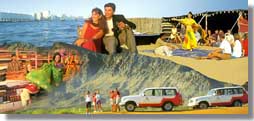|
INTRODUCTION
 The United Arab Emirates was
established on 2 December 1971 as a result of two distinct, but related,
events. One was the signature by the Government of the United Kingdom and
the rulers of the seven emirates (formerly known as the Trucial States or
Trucial Oman) of separate instruments bringing to an end the treaty
relationship that had existed between other was the them since the early
nineteenth century. The United Arab Emirates was
established on 2 December 1971 as a result of two distinct, but related,
events. One was the signature by the Government of the United Kingdom and
the rulers of the seven emirates (formerly known as the Trucial States or
Trucial Oman) of separate instruments bringing to an end the treaty
relationship that had existed between other was the them since the early
nineteenth century.
The other was the agreement between rulers of
six of the emirates, Abu Dhabi, Dubai, Sharjah, Ajman,
Umm Al Quwain and Fujairah, the
previously July, to establish a federation to be known as the United Arab
Emirates simultaneously with the ending of the treaty relationship with
Britain. The seventh emirate, to the new federation Ras Al Khaimah,
formally acceded on 10 February country.1972. Abu Dhabi was chosen to be
the capital of the United Arab Emirates.
The new federation
state had its basis in the Provisional Constitution. Adopted by the rulers
on behalf of their emirates, it represented a consensus on the form of the
state which they agreed to establish, and on the concessions that they
agreed to make with relation to a surrender of part of their sovereign
powers to the new federal body. In July 1996, the Supreme Council of the
Federation decided unanimously to drop the word 'Provisional' from the
Constitution.
Since the
establishment of the Federation, the UAE has become a member in regional
and international organisations. It has joined the Arab League and the
United Nations. The country is also a member of the Arab Gulf Co-operation
Council (AGCC) and a number of other international organisations.
The United Arab
Emirates is now entering its 27th year and celebrated its Silver Jubilee
in December, 2nd 1996. Since its birth as a federation of seven Emirates,
the UAE has developed at a rate guaranteed to stagger even the most
hardened of international commentators.
The success of the
diplomatic efforts that gave birth to the Federation, and which have
continued to nurture it throughout its growth, owe much to astute
leadership that has enabled a surge of progress hardly equaled anywhere in
the world.
It has witnessed a
remarkable and swift economic development, which is very difficult to
attain even in the most developed communities. The UAE has rapidly
maximised the benefits obtained through its immense oil proceeds to cater
for the basic requirements of the society. The UAE has lived up to the
expectations of the international community, and generously stood by Arab
World countries, and other developing countries in the rest of the world.
Much of this site is a
catalogue of development and a celebration of achievements, and the UAE's
citizens have every right to be proud of the many areas of progress that
can be seen in the country today.
CLIMATE
U.A.E. has a sub-tropical, arid climate.
Sunny, blue skies can be expected most of the year. Rainfall is infrequent
and irregular, falling mainly in winter. Temperatures range from a low of
about 10.5°C /50 °Fto a high of 48°C/118.4°F. The mean daily maximum is 24
°C/75.2 °F in January rising to 41°C/105.8 °F in July.
CLOTHING
Lightweight summer clothing is suitable for most
of the year, but sweaters or jackets may be needed for the winter months,
especially in the evenings.
Compared with certain
parts of the Middle East, U.A.E. has a very relaxed dress code. However,
care should be taken not to give offence by wearing clothing which may be
considered revealing, for example low-cut dresses, very short skirts, or
tight shirt or top in public.
At the pool or on the
beaches, trunks, swimsuits and bikinis are quite acceptable. Good quality
sunglasses are advised, and photochromatic lenses for those who wear
spectacles. Hats, or some protection for the head, are advisable when in
direct sunlight.
Top
GOVERNMENT
 The Supreme Council
of the UAE, comprising the hereditary rulers of the seven emirates, is the
highest federal authority. It is responsible for general policy matters
involving communications, education, defence, foreign affairs and
development, and for ratifying federal laws. The President, HH Sheikh
Zayed bin Sultan Al Nahayan, who is also Ruler of Abu Dhabi, and the
Vice-President, HH Sheikh Maktoum bin Rashid Al Maktoum, who is also Ruler
of Dubai, are elected by the Supreme Council from among its members. The Supreme Council
of the UAE, comprising the hereditary rulers of the seven emirates, is the
highest federal authority. It is responsible for general policy matters
involving communications, education, defence, foreign affairs and
development, and for ratifying federal laws. The President, HH Sheikh
Zayed bin Sultan Al Nahayan, who is also Ruler of Abu Dhabi, and the
Vice-President, HH Sheikh Maktoum bin Rashid Al Maktoum, who is also Ruler
of Dubai, are elected by the Supreme Council from among its members.
The Federal
Council of Ministers, responsible to the Supreme Council, has executive
authority to initiate and implement laws. The Federal National Council is
a consultative assembly of 40 representatives who are appointed for two
years by the individual emirates. The council monitors and debates
government policy but has no power of veto. While Abu Dhabi is the centre
of federal government activities, most ministerial departments also
maintain offices in Dubai.
INTERNATIONAL RELATIONS
The UAE became a member of the
United Nations and the Arab League in 1971. It is a member of the
International Monetary Fund, the Organisation of Petroleum Exporting
Countries (OPEC), the General Agreement on Tariffs and Trade (GATT) and
other international and Arab organisations, including the Arab Gulf
Co-operation Council (AGCC), whose other members are Saudi Arabia, Oman,
Qatar, Bahrain and Kuwait. In its foreign relations, the UAE's stance is
one of non-alignment but it is committed to the support of Arab unity.
ECONOMIC
POLICY
In matters unrelated to diplomacy and defence, each emirate
enjoys considerable autonomy in managing its own affairs. In business, the
government of Dubai is committed to liberal, free market policies and to
the creation of a business environment conducive to commercial activity.
This approach is well illustrated by the incentives available to investors
in the Jebel Ali Free Zone and by the continuing high level of public
sector investment in the infrastructure.
Top
CULTURE AND LIFESTYLE
 U.A.E.'s culture is firmly rooted in the Islamic traditions of
Arabia. Courtesy and hospitality are among the most highly prized of
virtues, and the visitor is sure to be charmed by the genuine warmth and
friendliness of the people. U.A.E.society is marked by a high degree of
tolerance for different lifestyles. Foreigners are free to practice their
own religion, alcohol is served in hotels and, provided reasonable
discretion is shown, the dress code is liberal. Women face no
discrimination and may drive and walk around unescorted. U.A.E.'s culture is firmly rooted in the Islamic traditions of
Arabia. Courtesy and hospitality are among the most highly prized of
virtues, and the visitor is sure to be charmed by the genuine warmth and
friendliness of the people. U.A.E.society is marked by a high degree of
tolerance for different lifestyles. Foreigners are free to practice their
own religion, alcohol is served in hotels and, provided reasonable
discretion is shown, the dress code is liberal. Women face no
discrimination and may drive and walk around unescorted.
Despite rapid economic
development in recent years, U.A.E. remains close to its heritage. Local
citizens dress in traditional robes and headress. Arab culture and
folklore find expression in poetry, dancing, songs and traditional art.
Weddings and other celebrations are colourful occasions of feasting and
music. Traditional sports such as falconry, camel racing and dhow racing
at sea continue to thrive.
LANGUAGE
RELIGION
Islam is the official religion of the UAE and there are a
large number of mosques throughout the country. Other religions are
respected and U.A.E. has Christian churches all over in different states.
RAMADAN
Ramadan is the holy month in which Muslims
commemorate the revelation of the Holy Koran. The timing of Ramadan is not
fixed in terms of the western calendar, but occurs a few days earlier each
year.
It is a month of
fasting when Muslims abstain from all food, drinks and cigarettes during
from dawn to dusk. Visitors are also required to refrain from consuming
these items in public places during this time as a sign of respect.
The of official
language is Arabic but English is widely spoken and understood Both
languages commonly used in business and commerce.
ALCOHOL
Alcohol is available in hotel and club
restaurants and bars. However, restaurants outside the hotels are not
permitted to serve alcoholic beverages. Permanent residents who are
non-Muslims can obtain liquor supplies without difficulty under a permit
system.
PHOTOGRAPHY
Normal tourist photography is acceptable but
it is considered offensive to photograph Muslim women. It is also
courteous to ask permission before photographing men. In general,
photographs of government buildings or military installations should not
be taken.
Top
HEALTH
REQUIREMENTS
No health certificates are required for entry to
United Arab Emirates, but it is always wise to check before departure, as
health restrictions may vary, depending upon the situation at the time.
CUSTOMS
Duty-free allowances: Cigarettes—2,000;
cigars—400; tobacco—2kg; alcohol non-Muslim adults only)—2 litres of
spirits and 2 litres of wine; perfume — a reasonable amount. No customs
duty is levied on personal effects entering United Arab Emirates. United
Arab Emirates Duty Free has a sales outlet in the Arrivals Hall (but
alcohol may only be purchased on departure).
Top
EDUCATION
 There is a
comprehensive network of government schools throughout the emirate,
providing free primary and secondary education to UAE nationals. There is a
comprehensive network of government schools throughout the emirate,
providing free primary and secondary education to UAE nationals.
The Ministry of
Education runs 34 boys' schools, 32 girls' schools and 10 kindergartens.
These work to an Arabic curriculum.
There are also 27
private institutes and 22 evening schools for adults. For expatriate
families, there are 79 private foreign schools offering education of a
high standard to the curriculum requirements of the UK, USA and a number
of others including Italy, Japan, Iran, India and Pakistan. In
neighbouring emirates there are French and German schools. English is
usually the main language of instruction, but other languages are used as
necessary by foreign schools.
Top
TAXATION
There is no corporate tax in UAE. The
only exceptions to this are oil producing companies and branches of
foreign banks. Likewise, there are no personal taxes. Direct taxation is
against the traditions of the UAE and it is highly unlikely that it will
be introduced in the near future.
EXCHANGE
CONTROL
 There are no exchange controls in the UAE and its currency,
the UAE dirham, is freely convertible. The dirham is linked to the USA
dollar, the currency in which oil revenues are paid. The current exchange
rate is Dh. 3.675 - US$ 1 and no revaluation has occurred since 1977. There are no exchange controls in the UAE and its currency,
the UAE dirham, is freely convertible. The dirham is linked to the USA
dollar, the currency in which oil revenues are paid. The current exchange
rate is Dh. 3.675 - US$ 1 and no revaluation has occurred since 1977.
BANKING
AND FINANCE
The regulatory authority since 1980 has been the UAE
central Bank. Some 47 commercial banks operate, with a total of around 350
branches, of which about 28 are foreign banks with a combined total of
more than 200 branches. Federal law restricts foreign banks to no more
than eight branches each.
TRADEMARKS AND PATENTS
Towards the end of 1992, the UAE
President enacted three Federal Laws on the protection of industrial and
intellectual property. These laws came into effect in 1993 and provide
protection against commercial piracy and fraud. The laws are: Federal Law
No. 37 of 1992 on Trademarks, Federal Law No. 40 of 1992 on Protection of
Intellectual Property and Copyright, and Federal Law No. 44 of 1992 on
Protection of Industrial Property.
LEGAL
SYSTEM
There is a comprehensive framework of legislation to ensure
that business in the UAE is conducted in a fair and orderly manner. There
are laws dealing with commercial transaction, intellectual property,
labour and other aspects of business life. Dubai has many local and
international law firms willing to advise foreign business organisations
on legal matters. There are Federal Courts in all emirates except Dubai
and Ras Al Khaimah, which have retained their local courts.
Dubai has
civil, criminal and Shariah (Islamic) Courts of first instance. All court
decisions may be brought to the Dubai Court of Appeal. Thereafter, a final
appeal may be made to the Dubai Court of Cassation. The Civil Court (as
opposed to the Shaiah Court) has jurisdiction over labour, civil and
commercial transactions, as well as personal matters (e.g. wills, divorces
etc.) relating to non-Muslims. The language of the Courts is Arabic and
advocates admitted to plead are Arab nationals.
source:
asiatravel.com
Top
|  The United Arab Emirates was
established on 2 December 1971 as a result of two distinct, but related,
events. One was the signature by the Government of the United Kingdom and
the rulers of the seven emirates (formerly known as the Trucial States or
Trucial Oman) of separate instruments bringing to an end the treaty
relationship that had existed between other was the them since the early
nineteenth century.
The United Arab Emirates was
established on 2 December 1971 as a result of two distinct, but related,
events. One was the signature by the Government of the United Kingdom and
the rulers of the seven emirates (formerly known as the Trucial States or
Trucial Oman) of separate instruments bringing to an end the treaty
relationship that had existed between other was the them since the early
nineteenth century.  U.A.E.'s culture is firmly rooted in the Islamic traditions of
Arabia. Courtesy and hospitality are among the most highly prized of
virtues, and the visitor is sure to be charmed by the genuine warmth and
friendliness of the people. U.A.E.society is marked by a high degree of
tolerance for different lifestyles. Foreigners are free to practice their
own religion, alcohol is served in hotels and, provided reasonable
discretion is shown, the dress code is liberal. Women face no
discrimination and may drive and walk around unescorted.
U.A.E.'s culture is firmly rooted in the Islamic traditions of
Arabia. Courtesy and hospitality are among the most highly prized of
virtues, and the visitor is sure to be charmed by the genuine warmth and
friendliness of the people. U.A.E.society is marked by a high degree of
tolerance for different lifestyles. Foreigners are free to practice their
own religion, alcohol is served in hotels and, provided reasonable
discretion is shown, the dress code is liberal. Women face no
discrimination and may drive and walk around unescorted.
 There is a
comprehensive network of government schools throughout the emirate,
providing free primary and secondary education to UAE nationals.
There is a
comprehensive network of government schools throughout the emirate,
providing free primary and secondary education to UAE nationals.
 There are no exchange controls in the UAE and its currency,
the UAE dirham, is freely convertible. The dirham is linked to the USA
dollar, the currency in which oil revenues are paid. The current exchange
rate is Dh. 3.675 - US$ 1 and no revaluation has occurred since 1977.
There are no exchange controls in the UAE and its currency,
the UAE dirham, is freely convertible. The dirham is linked to the USA
dollar, the currency in which oil revenues are paid. The current exchange
rate is Dh. 3.675 - US$ 1 and no revaluation has occurred since 1977.